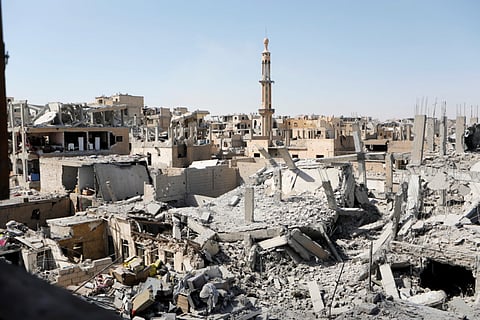Will the Levant implode?
Iraq, Syria and Lebanon are caught in the vortex of dramatic socio-political changes

The binding referendum planned by the Kurdistan Regional Government (KRG) next September 25, on whether or not to secede from Iraq, will surprise many. It will almost certainly pass after a test-run proved that Kurds were ready to “fire Baghdad” from their midst. In Syria, and notwithstanding recent gains by government forces against opposition elements, secessionist forces endure. Partition demons plague Lebanon too, as local leaders pretended to uphold putative commitments to the country’s sovereignty and territorial integrity, while encouraging separation that, for all practical purposes, is a fait accompli.
No matter how unpalatable, are the three Levantine States in danger, or will they survive concerted efforts to partition them?
The last time Kurds held a referendum was in 2007 in what was then a non-binding vote. Few remember those results even if they topped the 99 per cent in favour of secession. Naturally, we do not know what will happen next month, though public opinion polls in Iraqi Kurdistan favour an independent state. No matter its outcome, however, the key result will come on September 26, when regional and global powers will either recognise or ignore Kurdish political wishes.
In the event, what cannot be overlooked are the consequences on the ground with the KRG effectively representing a plurality of the Kurdish population, most of which rejected various Arabisation programmes over the years and, after 2011, spurned Persian encroachment. To be sure, demographic data is hard to come by in 2017, but there is no doubt that Kurds now form the overwhelming majority in their region, as scores of Arabs and Turkmens have left the area during the past decade. Any financial or military backing from neighbouring countries to rig the referendum will surely backfire, especially in the oil-rich Kirkuk Governorate [one of four under KRG rule — the others are Dohuk, Erbil, and Suleimaniyah], where Iran and Turkey are engaged in a low-intensity-political-conflict.
Indeed, Ankara perceives the KRG as an ally of its own Kurdish separatists (within the Kurdistan Workers Party), and Tehran believes that its hold of Iraq will be seriously weakened were Kurdistan to leave the union. Neither wishes to see an independent Kurdish state, as this will embolden Kurds within Turkey and Iran. In short, both will discourage independence for fear that irredentism will gain the upper hand in their respective countries. Consequently, neither is likely to acknowledge an independent Kurdistan — though most western powers will likely do so — with the real danger that both might consider armed conflict, including an invasion, even if such an outcome will be difficult, to say the least.
Syria’s fate is equally complicated as the ongoing war, which pundits believed would be over in less than two weeks back in March 2011, is now entering its seventh year. With Iranian and Russian assistance, Damascus smothered opposition forces, in what pro-Syrians claim are undeniable successes. Still, whether the totalitarian regime will survive over the long term is highly questionable, though the human appetite for genocide seems to never go out of fashion. Time will tell whether Syria will be split between several nationalities, including a key Kurdish territory in the north, something that geostrategists believe is inevitable, given existential clashes between two available choices: Totalitarian rule vs democratisation.
Similarly, and like the Sword of Damocles, partition also hangs over the Lebanese who seem determined to squander their freedoms. Beirut faces this peril because those in positions of power seldom focus on the state. Some speak of federalism [Phalange Party] as an alternative, while others invent magical formulae than range the gamut from the people-army-resistance triptych [Hezbollah] to the army-people-state [Lebanese Forces] sobriquet. Of course, Hezbollah and the Amal parties envisage a new constitutional convention that will result with an updated national pact, dubbed the Thulathiyyah [Trisection] Accord. That tripartite power-sharing formula between Christians, Sunnis and Shiites will, presumably, strengthen the country’s increasingly mythical “mutual coexistence” (Al Aysh Al Mushtarak) preferences, though few practice it.
Levantines are caught in the vortex of dramatic socio-political changes that are beyond their control. In all three countries, influential and powerful outside forces are determined to redraw the map, all to advance their own interests. All three are fragile entities. Few remember it now, but Moscow prepared a draft constitution for Syria just last year, which acknowledged the need for decentralisation — even going so far as dropping the word “Arab” from the official name of the country — while every Lebanese political leader uses the word without giving it a second thought, and decentralisation is already a reality in Iraqi Kurdistan. Under the circumstances, few should be surprised if the Levant proliferates.
— Dr Joseph A. Kechichian is the author of The Attempt to Uproot Sunni Arab Influence: A Geo-Strategic Analysis of the Western, Israeli and Iranian Quest for Domination (Sussex: 2017)


